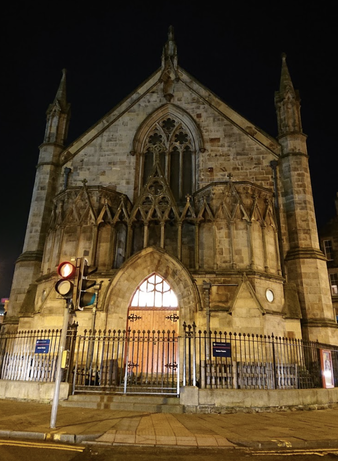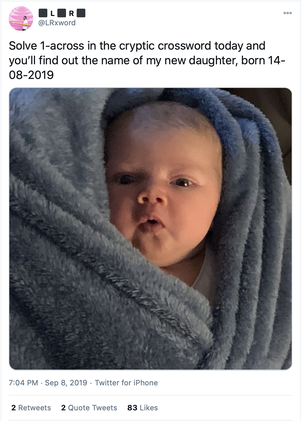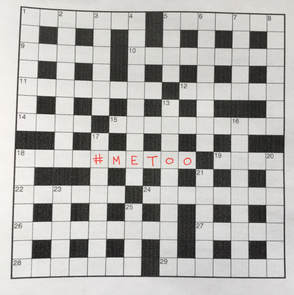And guess what? Today's the day that we all give a collective "Thank You!" to Sally because I was able to find the right grid from her stockpile and share it with you.
Happy solving, everyone!
|
Every once in a while, The Globe and Mail publishes the wrong grid with their cryptic crossword. The first time I saw this happened, I reverse engineered the grid and shared my hand-drawn version. Since then, I've been in touch with a lovely woman named Sally who has saved all the grids used over the years, just in case she needed to find a mismatched one in the future.
And guess what? Today's the day that we all give a collective "Thank You!" to Sally because I was able to find the right grid from her stockpile and share it with you. Happy solving, everyone!
6 Comments
Happy Holidays! I've made you a gift again this year: a holiday-themed cryptic crossword puzzle! I hope you enjoy it! Safe, healthy and happy holidays to all, Sarah
 When I was student, living in Edinburgh, I attended the most wonderful performance of Dracula at the Bedlam Theatre. The acting was creepy and superb, and the Bedlam theatre itself, being a decommissioned Neogothic church, was an ideal location, but what really blew my mind was the way the actors were not confined to the stage. Characters made dramatic entrances or exits by walking straight down the aisles, between the rows of audience members. During the intermission, one character skulked by the bar in the lobby, his demeanor growing more and more disturbed until, intermission nearly over, he made a conspicuous departure. The troupe didn’t quite break the fourth wall—that invisible, imaginary wall that divides the actors from the audience—but they made us feel its fragility. As you’ll know if you’ve read this blog before, the very first thing I tell someone unfamiliar with cryptic crosswords is that it’s a form of codebreaking: the answer is the message, the clue is the code, and the solver’s job is to crack it. But something I hadn’t really thought of until I started teaching courses is that in cryptic crosswords, as in theatre, there is a kind of “fourth wall”—an invisible barrier between the setter and the solver that, when broken, connect the setter with her solver in an unexpectedly personal way. I don’t know why I didn’t realize this before because there are so many examples of it happening.  In November of 2013, the Australian setter LR published a cryptic crossword in The Age with a message given in the first four Across answers: MEREDITH TICKET SEVERELY NEEDED. The Meredith Music Festival is an annual three-day concert held on private land in Victoria, Australia, and LR was frantic to go. Last year, LR stepped right out through that fourth wall into the audience to shake everyone’s hand, exhausted and ecstatic (or so I picture it, anyway) when he became a father and shared his baby’s name with the world in a clue. A few years ago, Fraser Simpson published a fantastic themed puzzle which, he said, marked a “grand occasion”. Solvers discovered, as they worked, that there was an extra letter in 16 of the answers. Putting these together, in order, revealed this message: THOUSANDTH PUZZLE. A remarkable achievement that deserved recognition. Fraser Simpson breaks the fourth wall again today in his puzzle with these two clues:
A9: Shift focus this writer put into paper purchase (5) D5: Hearten crossword solver beginning to buck up (4) You can’t solve this if you don’t adopt Mr. Simpson’s point of view. When you do, it becomes clear that “this writer” in A9 is “I” and “crossword solver” in D5 is “you”. What’s your favourite example of the fourth wall of cryptic crosswords being broken? Happy puzzling. Sarah Cryptic crosswords are the epitome of creativity in confinement. There’s the confinement of the grid, which is typically square and symmetrical, with clear conventions on the placement of lights (white squares). Then there are the clues, which require mathematical precision in their construction (if you’re a Ximenean constructor like me, anyway). One might think that confinement like this would squash any creative instinct. But instead, creativity thrives. Just think of the all-lights grid that Fraser Simpson created for The New Yorker when told that the print magazine could not support a typical 15x15 grid. Just think of the endless parade of clever clues we read every week. A few Saturdays ago, my favourite part of Fraser Simpson’s puzzle was the way in which he used the answer of one clue as the definition portion of the next: 3 Down: Going it alone, Han? (6, 4) 4 Down: Foreign capital 3-Down (4) When the lockdown first happened, it was still winter here and Montrealers were told not to leave their neighbourhoods. To motivate my kids to go outside, I wrote an interactive neighbourhood mystery story that is played using local landmarks as hints. I made it freely available to everyone in the community and it was so popular that I wrote a second. (You won’t be able to solve them unless you actually play the games -- sorry, non-Montrealers!)
It took several weeks of puzzling, and the carpentry work of my father (thanks again, Dad!), but I now have two Locked Box Mystery games available for rent: one for kids and one for adults. Adults stand to inherit a substantial sum if only they can locate the bank account number and passcode. Kids have been recruited by INTERPOL to help catch a couple of international jewelry thieves.
And yet, the more the pressures of the lockdown squeezed me, the more something creative and thoughtful within me fought back. No matter how busy I was, my mind lapsed into periods of reflecting and imagining and planning.
When my children tantrumed, fed up with the confinement and isolation and fear, I had to dig deep (very deep) for emotional resolve.
But then again, so did everyone. No matter our circumstances, no matter how relatively easy it was or how rough, we all had to become very deliberate in our actions, from the medically necessary (washing hands and not touching our faces) to the aspirational (exercising more, following through on learning new skills). I came across this article from the BBC a few weeks ago about people who have received surprising messages of apology from their exes (and another one published yesterday). When I first read it, all I saw was the de-liberation of confinement and the deliberation it provoked. But these thoughtful individuals were also deliberate: they didn’t just think about how they had treated their exes poorly, they deliberately got in touch and apologized. I’m still working out how I can do “deliberate” three ways in a clue, bringing in the intentionality that Fraser Simpson’s clue didn’t have. Here’s my best attempt so far: Think “lock up?” on purpose (10) But I’m sure you can do better. How would you clue all three definitions of “deliberate”? It's incredibly exciting and satisfying to receive emails from readers who say that the tutorial on this blog helped them learn to solve cryptics.
It's even more fun to see them learn face to face, which is why I've launched a six-part course introducing people to cryptic crosswords. It's taught through Zoom, so it's available to everyone, anywhere in the world. There are weekly lessons, plus worksheets to help the concepts sink in. If you'd like to take one, or if someone you know might enjoy it, send me a message through the Contact Me link to learn about rates and the upcoming course schedules. If, like me, you awake on Saturday morning with a thrill of excitement, knowing that Fraser Simpon's cryptic crossword awaits you in the Globe & Mail, you will have felt crushing disappointment this morning. In today's puzzle, the clues don't match the grid. This isn't the first time it's happened, although it's rare. A few years ago, when I discovered that the grid didn't match I reverse engineered the grid based on the clues provided. (That was back in my pre-toddler days when I had more time!) It was so exciting to be able to share the right grid with all of you. I even got a shout out from the public editor at the Globe & Mail, which was a lot of fun. And it brought me in touch with other cryptic crossword fans, including one named Sally who has been compiling Fraser Simpson's grids for years just in case a mismatch happens. She kindly sent me her library. So, let's all give Sally a big "Thank you!" Because when I saw the mismatch today, I immediately dug out her old email and located the right grid. I'm happy to be able to share it with all of you. Happy puzzling!
If you grew up in Ontario in the 1980s like I did and you're tackling this Saturday's Globe and Mail cryptic crossword by the great Fraser Simpson, you'll notice two things that other solvers might miss. The first is a blatant and, to me, very welcome political commentary in 8 Down: "Done with Ford," I snarled (3, 2) As with any great cryptic clue, you don't have to know who Ontario Premier Doug Ford is to solve this riddle, which is an anagram. But there's a whole other level of satisfaction if you do. Doug Ford, is the brother of the internationally notorious, and now deceased, crack-smoking Toronto mayor Rob Ford. Among the many, many things Doug Ford is enacting as the newly elected Ontario Premier that are infuriating Ontario residents (especially teachers, which Fraser Simpson is, parents, and anyone else who cares about the education of an entire generation of fellow residents) are extreme cuts to education funding. Experts predict these will have profoundly negative effects on students. As I've blogged about before, here and here, cryptic crosswords have a long and interesting history of serving as a vehicle for political messages. This is not surprising: setting cryptic crosswords is a form of creative writing, and writers have long found wonderfully creative ways of asserting their political stances, including, more recently in the U.S., the use of an acrostic in the resignation letter of the U.S. President's Committee on the Arts and the Humanities, and the creation of a special two-part "The Writers Resist" episode of the Dear Sugars podcast. Now, the Ontario budget cuts are making headlines across the country; you didn't have to grow up in Ontario in the 1980s to appreciate it. But if you did -- if you were a student during the Mike Harris era like I was -- you will be feeling an especially maddening sense of déjà vu. The second clue that shoots right to the heart of 1980s Ontario kids is 26 Down: Bruno's roomie at Macdonald Hall voices displeasure about start of term (5)
My daughter learned about recycling and reusing at her daycare this week. A tagline for the environmental movement is "Think Globally, Act Locally".
Culture typically works the same way, though perhaps to our detriment. We make art, we practice culture, here, in our studios, in our homes, but unless we take measures to tune it out, the vast majority of the cultural information we receive is global. My friend and fellow writer Derek once argued that when we are all inundated with the same cultural references, we become homogenous in our creative thinking. I have thought about that for a long time. It's why I think it is so important to not just see the blockbuster movies and read the best-selling books, but to explore local art exhibits, seek out TV shows and films with smaller distributions, discover authors we have never heard of, buy foods from local shops and not just chain grocery stores. Thank you, Fraser Simpson, for flipping the script, and bringing local Ontario cultural references to the world with today's puzzle.  This past Saturday, I was a little surprised to see the following clue in Fraser Simpson’s Globe and Mail puzzle: Escort enters sound bargain with the prosecutor (4, 4) I stared at it and wondered: could it be it anything but a reference to President Trump’s alleged affair with the porn star Stormy Daniels and the $130,000 his lawyer, Michael Cohen, paid her not to disclose it?  On Saturday, April 14, 2018, Fraser Simpson published a simple clue in the Globe and Mail cryptic crossword that made me want to cheer: Actress McGowan stood up (4) Why cheer for this? You may ask. It’s just a straightforward double meaning clue. The actress in question is Rose McGowan. And if someone stood up, they rose from their seat. Here’s why. |
About Sarah
I'm a writer, adventurer, amateur setter of cryptic crosswords, lover of "ah-ha!" moments, and exhausted mom. Archives
November 2021
Categories
All
|
||||||||||||||||||